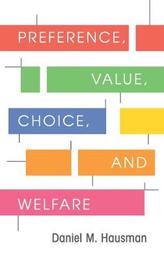
|
Preference, Value, Choice, and Welfare
Hardback
Main Details
| Title |
Preference, Value, Choice, and Welfare
|
| Authors and Contributors |
By (author) Daniel M. Hausman
|
| Physical Properties |
| Format:Hardback | | Pages:168 | | Dimensions(mm): Height 235,Width 157 |
|
| Category/Genre | Economic theory and philosophy |
|---|
| ISBN/Barcode |
9781107015432
|
| Classifications | Dewey:658.8343 |
|---|
| Audience | | Postgraduate, Research & Scholarly | |
|---|
| Illustrations |
20 Line drawings, unspecified
|
|
Publishing Details |
| Publisher |
Cambridge University Press
|
| Imprint |
Cambridge University Press
|
| Publication Date |
12 December 2011 |
| Publication Country |
United Kingdom
|
Description
This book is about preferences, principally as they figure in economics. It also explores their uses in everyday language and action, how they are understood in psychology and how they figure in philosophical reflection on action and morality. The book clarifies and for the most part defends the way in which economists invoke preferences to explain, predict and assess behavior and outcomes. Hausman argues, however, that the predictions and explanations economists offer rely on theories of preference formation that are in need of further development, and he criticizes attempts to define welfare in terms of preferences and to define preferences in terms of choices or self-interest. The analysis clarifies the relations between rational choice theory and philosophical accounts of human action. The book also assembles the materials out of which models of preference formation and modification can be constructed, and it comments on how reason and emotion shape preferences.
Author Biography
Daniel M. Hausman is the Herbert A. Simon Professor of Philosophy at the University of Wisconsin-Madison. He was educated at Harvard and Cambridge Universities and received his Ph.D. in 1978 from Columbia University. His research has centered on epistemological, metaphysical and ethical issues at the boundaries between economics and philosophy. He co-founded the Cambridge University Press journal Economics and Philosophy with Michael McPherson and co-edited it from 1984-1994. He is the author of Capital, Profits, and Prices (1981), The Inexact and Separate Science of Economics (1992), Causal Asymmetries (1998) and Economic Analysis, Moral Philosophy, and Public Policy (2006, with Michael McPherson), among other titles. He has published more than 130 essays in academic journals in philosophy and economics. In 2009, Professor Hausman was elected to the American Academy of Arts and Sciences.
Reviews'Daniel Hausman has given us a careful, thoughtful disposition on the nature of preferences, which lie at the heart of economics. We thereby learn the basis for what economists are practising when they are preaching.' George Akerlof, Nobel Laureate in Economics, 2001 'To its great loss, mainstream economics has drifted far from philosophy. Dan Hausman, a longtime force against the drift, brings a lifetime of research to this authoritative account of preferences - what they do and should mean to economists and how we can restore a welfare economics that is philosophically and psychologically sound. As social science once again comes together - a project to which this book greatly contributes - this will be one of its central texts.' Angus Deaton, Woodrow Wilson School, Princeton University 'In this penetrating book, Daniel Hausman lays to rest simplistic as well as currently fashionable theories about what preferences are. I think his conception gets it exactly right.' Jon Elster, Columbia University 'Not only is Dan Hausman an outstanding philosopher but he also has a profound understanding of economics and its fundamental concepts. Both these characteristics are on display in this excellent book. Economists will feel a little uncomfortable as some of their most cherished ideas are examined in forensic detail, but Hausman's analysis of preferences choice and welfare places these concepts on firm philosophical foundations, thereby enabling the construction of both better theory and more sensible policy.' Julian Le Grand, London School of Economics 'Daniel Hausman is one of the world's leading philosophers of economics. In this subtle and intelligent book he examines the concept of preference as used in microeconomics, game theory, and welfare economics. He uncovers the tensions between the different interpretations of preference in economics. He offers a resolution that challenges some of the discipline's most cherished dogma but is broadly consistent with its existing practice. It is difficult to imagine a more convincing philosophical defense of what most economists do.' Robert Sugden, University of East Anglia
|